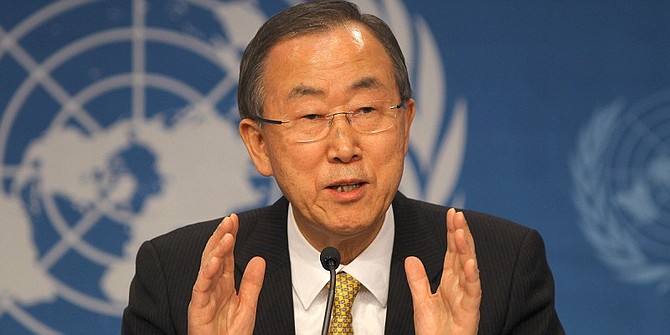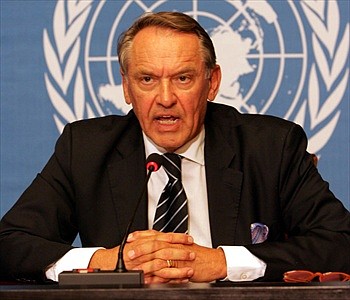United Nations to Conduct Race Relations Study in Chicago
In light of recent public protests against alleged police brutality involving minorities in Chicago and the steady flow of calls from African American leaders for Mayor Rahm Emanuel to resign, it doesn’t come as a huge surprise that the United Nations (UN) has chosen the “Windy City” to conduct a study on race relations.
A group of UN delegates will arrive next week to dissect Chicago’s current state of affairs as it relates to race. The group is scheduled to meet with Mayor Emanuel (and/or members of his staff), Cook County officials and concerned citizens during a public forum at Chicago State University on the city’s south side.
“I would hope that the UN would include an examination of the socio and economic disparity that we see in this city,” personal injury attorney Larry Rogers, Jr. told the Chicago Citizen Newspaper. “The city of Chicago has a clear history, a segregationist history and many people who visit see that what you see on the south and west sides of Chicago is very different from what you see downtown and on the north side.”
Rogers is representing the family of Betty Jones who was shot and killed by accident by Chicago Police officers who were responding to a domestic disturbance call on Dec. 26, 2015.
“Betty Jones died on Dec. 26 of 2015, in an accidental shooting. I would suggest it was more akin to very reckless behavior by police officers, said Rogers. “When you’re firing a high caliber weapon at and into the walls and doorway of a home that you know innocent people are inside of, that’s reckless conduct that will endanger life. I think when you look at the number of instances across the city of Chicago where largely black and brown people are being shot, there clearly has to be some consideration for what race plays in those incidents.”
The UN hasn’t revealed exactly what it will focus on while studying race relations in Chicago, but upon the Chicago Citizen’s Newspaper’s review of the UN’s International Convention on the Elimination of All Forms of Racial Discrimination (enacted in 1965) it is safe to assume that Article 2 of the document will be used as a guideline.
Article 2 (International Convention on the Elimination of All Forms of Racial Discrimination)
- States Parties condemn racial discrimination and undertake to pursue by all appropriate means and without delay a policy of eliminating racial discrimination in all its forms and promoting understanding among all races, and, to this end:
(a) Each State Party undertakes to engage in no act or practice of racial discrimination against persons, groups of persons or institutions and to en sure that all public authorities and public institutions, national and local, shall act in conformity with this obligation;
(b) Each State Party undertakes not to sponsor, defend or support racial discrimination by any persons or organizations;
(c) Each State Party shall take effective measures to review governmental, national and local policies, and to amend, rescind or nullify any laws and regulations which have the effect of creating or perpetuating racial discrimination wherever it exists;
(d) Each State Party shall prohibit and bring to an end, by all appropriate means, including legislation as required by circumstances, racial discrimination by any persons, group or organization;
(e) Each State Party undertakes to encourage, where appropriate, integrationist multiracial organizations and movements and other means of eliminating barriers between races, and to discourage anything which tends to strengthen racial division.
It also has not been confirmed who from the UN will actually travel to Chicago, but a good guess would include UN Deputy Secretary-General Jan Eliasson, who last month in an event to mark the fiftieth anniversary of the International Convention on the Elimination of All Forms of Racial Discrimination asserted, “This Convention, as you may know, was the very first United Nations human rights treaty. It was a landmark moment in a fight that we are still engaged in to this day; to ensure equality and a life of dignity for all. No human being is to experience discrimination because of race.”
The UN’s announcement about its study in Chicago is appropriate and timely, coming when the entire world is scrutinizing the city because of its gun violence epidemic and the strained relationship between the Chicago Police Department and minority citizens.
But will the study change anything? Will race relations improve in Chicago upon the studies completion? Will the study provide answers and solutions to many of Chicago’s race related issues? That is yet to be determined.
Latest Stories
- Illinois State Rep. Introduces Legislation To Empower Young Voters
- Daughters Of Oscar Brown, Jr. Keep His Legacy Alive
- Simone Green Releases Single “Black Queen”
- Erie Family Health Center Opens The Sankofa Village Wellness Center
- Chicago HBCU Baseball Classic Set For This Spring
Latest Podcast
MEDICAL POWER OF ATTORNEY



